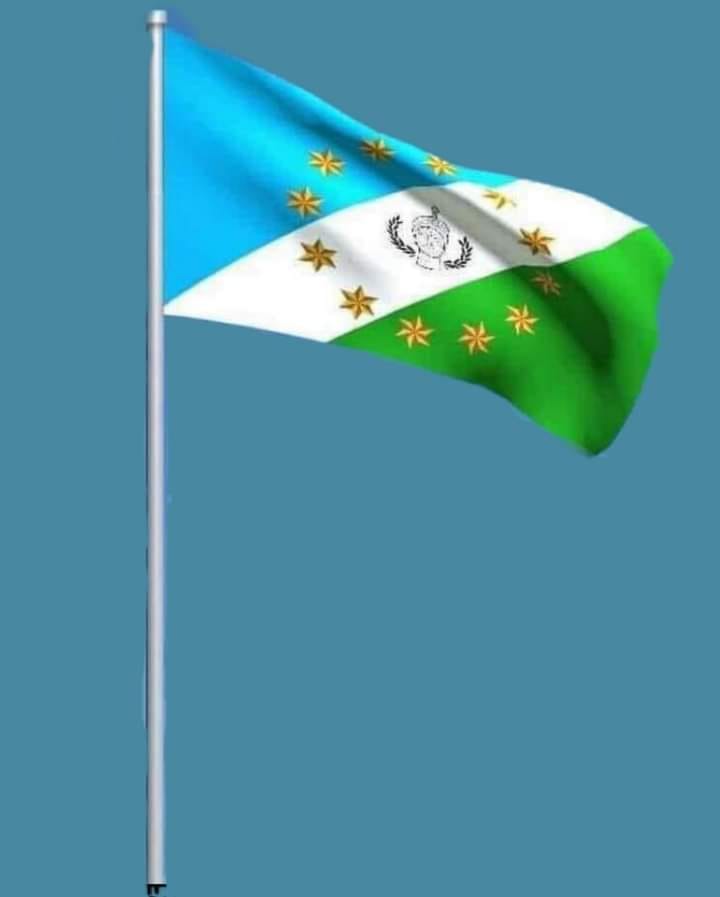Biblical Theology of Yoruba Nation Declaration: The Spiritual and Physical Dimensions of Self-Determination Struggle
- By Pastor Dele Ilesanmi, Ph.D.
- Published in Christopress Blog



By
Pastor Dele A Ilesanmi, Ph.D
Introduction
3 For though we walk in the flesh, we do not war after the flesh: 4For the weapons of our warfare are not carnal, but mighty through God to the pulling down of strong holds (2 Cor. 10:3-4)
For we wrestle not against flesh and blood, but against principalities, against powers, against the rulers of the darkness of this world, against spiritual wickedness in high places. (Eph.6:12)
The writer’s first article on the Yoruba Self-Determination Struggle titled “Yoruba Nation Independence: A Biblical and Theological Perspective” centres on leadership, Faith, unity, and Ekitiparapo model of war. But, in this second article, the writer focuses on Theology of Yoruba Nation Declaration vis-a-vis the Spiritual and Physical Dimensions of Self-Determination Struggle.
The impetus for this second piece comes from the realization of the fact that freedom from slavery requires a war that goes beyond physical engagement. Theologically and biblically speaking, every battle has both spiritual and physical dimensions. A battle is first won from the spiritual realm before its physical manifestation because the spiritual controls the physical, the invisible controls the visible. We must understand that spirituality goes beyond religiosity even though there is a nexus between the two. The question of spirituality and its role in the self-determination struggle is a major factor that shapes the practicality and gravity of our decision to carve out for ourselves a separate identity. What is more, the magnitude of our corporate effort directed towards our desired goal of Yoruba Sovereignty within the cosmos will determine our readiness for a just cause which the laws of Nature and God entitle us.
Spiritual and Physical Nexus
For every physical manifestation of victory, there is a spiritual foundation. There is no victory without divine or spiritual engagement. In a war or struggle for self-determination, the spiritual comes before the physical. However, the two can also go simultaneously. In Exodus 12:1-51, the children of Israel, led by Moses, first had a spiritual engagement with God who fought their battle for them in the land of Egypt before the physical engagement. King Jehoshaphat sought God for help and direction before waging war against the enemies of Judah and also engaged in both spiritual and physical dimensions of war (2 Chronicles 20:1-30). What about David in 1Samuel 17:1-50? He believed in the potency of God’s power. He boasted of God’s deliverance in the past by praising Him for victory over the uncircumcised Philistine called Goliath before going against him, the terrorist (Goliath). Similarly, Jephthah, the mighty man of valour who quenched the violence of fire and subdued kingdoms, sought God’s face before waging war against the children of Ammon (Judges 11:11) and the LORD God of Israel gave him victory (Judges 11:1-33). But in Exodus 17:1-13, both spiritual and physical dimensions of war were engaged simultaneously by Moses. No doubt, the spiritual preparation begets the physical manifestation of success or victory in a battle. Thus, the spiritual dimension of the Yoruba Self-Determination Struggle is as important as the physical dimension.
Moses’ Spiritual and Physical Engagement
8 Then came Amalek, and fought with Israel in Rephidim. 9 And Moses said unto Joshua, Choose us out men, and go out, fight with Amalek: to morrow I will stand on the top of the hill with the rod of God in mine hand. 10 So Joshua did as Moses had said to him, and fought with Amalek: and Moses, Aaron, and Hur went up to the top of the hill. 11 And it came to pass, when Moses held up his hand, that Israel prevailed: and when he let down his hand, Amalek prevailed. 12 But Moses’ hands were heavy; and they took a stone, and put it under him, and he sat thereon; and Aaron and Hur stayed up his hands, the one on the one side, and the other on the other side; and his hands were steady until the going down of the sun. 13 And Joshua discomfited Amalek and his people with the edge of the sword (Exodus 17:8-13)
Moses was the principal leader of the Israelites in their Exodus from Egypt. He led the people through the wilderness. He was a mediator of the law. He was a spiritual war strategist who depended on God for victory. All this combined with his leadership acumen, inspiration, and vision gave the Israelites victory over the Amalekites. Moses understood by divine inspiration that physical combat requires spiritual support for victory to be ascertained. He appointed Joshua to choose some men to go with him to the war front to fight the Amalekites physically while he (Moses), as an old man, chose to go for spiritual war with the staff of God in his hand together with two other men –Aaron and Hur – on the top of the hill to support the physical battle led by Joshua. As Moses raised his two hands with the staff of God, praying to God, the Israelites prevailed against Amalekites (Exodus 17:9-11).
David’s Spiritual and Physical Engagement
Similarly, the spiritual application to physical combat culminated in David’s victory over Goliath (1Samuel 17:1-58). David depended on God and not on swords, spears, and shield; not on his wisdom, skill and education; and not on his credentials and power. Besides, after David had persuaded King Saul that, with God on his side, he would defeat Goliat, King Saul finally consented to support David and prayed for him: “…Go, and the LORD be with thee” (1Samuel 17:37). This implies that for a successful physical engagement, there is a need for spiritual foundation.
45 Then said David to the Philistine, Thou comest to me with a sword, and with a spear, and with a shield: but I come to thee in the name of the LORD of hosts, the God of the armies of Israel, whom thou hast defied. 46 This day will the LORD deliver thee into mine hand; and I will smite thee, and take thine head from thee; and I will give the carcases of the host of the Philistines this day unto the fowls of the air, and to the wild beasts of the earth; that all the earth may know that there is a God in Israel. 47 And all this assembly shall know that the LORD saveth not with sword and spear: for the battle is the LORD’s, and he will give you into our hands. 48 And it came to pass, when the Philistine arose, and came and drew nigh to meet David, that David hasted, and ran toward the army to meet the Philistine. 49 And David put his hand in his bag, and took thence a stone, and slang it, and smote the Philistine in his forehead, that the stone sunk into his forehead; and he fell upon his face to the earth. 50 So David prevailed over the Philistine with a sling and with a stone, and smote the Philistine, and slew him; but there was no sword in the hand of David (1 Sam 17:45-50)
Lessons we can learn from these two Dimensions
- God must not be out of our plans in our collective struggle for freedom.
- Self-determination has spiritual and physical dimensions
- Physical combat requires spiritual support
- All self-determination agitators cannot lead at a time: there must be a primary leader and sub-leaders. For example, Moses chose Joshua to lead men to war while Aaron and Hur supported Moses to fight the spiritual war to complement the physical war led by Joshua, even though both (Aaron and Hur) were leaders in their own right. Aaron was Moses’ elder brother, a leader during Israel’s early days and the first of its high priests. Similarly, Hur was another leader who held up the arms of Moses and helped Aaron to judge the people while Moses went up to Mount Sinai in Exodus 24:14
- We should not overestimate the value of supporting role. Moses needed Joshua, Aaron, Hur, and other men who went to war. Moses could not have achieved success and victory as a leader if he had ignored these committed, faithful, and loyal supporters. Thus, a leader needs committed, faithful, and loyal people to work with.
- We need to be obedient to the leader in authority. This is vital to the success of a collective struggle for self-determination. Joshua obeyed Moses when he was appointed to choose warriors to go and fight the Amalekites. Aaron obeyed Moses, his younger brother. Hur and other leaders unnamed were subject to the leadership of Moses for the success of their struggle against the external and common enemies. Ditto the great and powerful Ekitiparapo warriors obeyed the leadership of Fabunmi and Ogedegbe to fight against external and common enemies in 1877-1893. Thus, “Ekitiparapo Model of War” as suggested in my last article is recommended for adoption in our collective struggle for the Yoruba Self-Determination Struggle.
- Trustworthy and courageous leaders who fear God are also needed “And David said to Saul, Let no man’s heart fail because of him; thy servant will go and fight with this Philistine” (1Samuel 17:32)
- Faith in God is required to subdue enemies and their kingdoms.
- We need the support of our Yoruba kings and leaders (both spiritual and secular). After David had persuaded King Saul that, with God on his side, he would defeat Goliat, King Saul finally consented to support David and prayed for him: “…Go, and the LORD be with thee” (1Samuel 17:37). We the support and prayer of our kings and leaders in Yoruba land in this our collective struggle for independence. Though all will not support us, we just need one or two representatives from each state that comprises the Yoruba nation including, most importantly, the Ooni of Ife. However, without these leaders, God can do it.
Conclusion
When we engage God in our matters, we will not struggle for victory. As spiritual beings, we only fight a battle that has already been won. When it comes to spiritual warfare, God has already given us victory because He is a Man of war (Exo.15:3). God has never been defeated in a war. The battle we are fighting now is not ours but the LORD’s. David said it in 1Samuel 17:47 and the Spirit of God said it in 2Chronicles 20:14-15. Engaging God in Yoruba Self-determination (Sovereignty, Freedom, or Independence) struggle before the rally and declaration will precipitate the realization of our goal. Therefore, let us work on our spiritual aspect in concomitant with our physical engagement for the realization of our common cause – the Yoruba Sovereignty. May God help us (Amen).
Share this:

